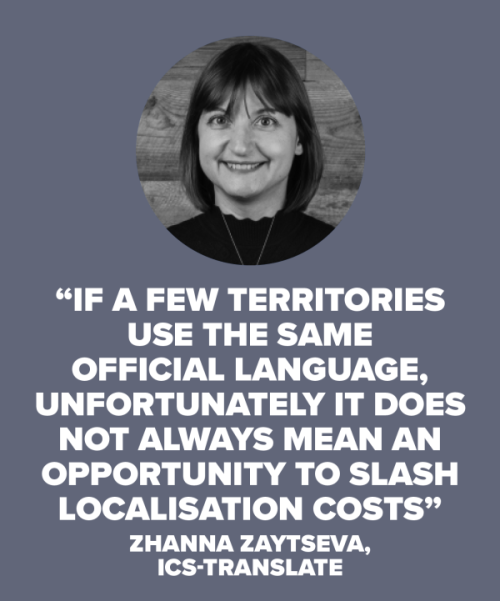Going international

Why is localising content for specific territories so important as part of an operator’s expansion strategy?
As someone who has worked in the igaming sector for a number of years, I would say that in general there seem to be two types of operator: those who make localisation part of their overall growth strategy from the start, and those for whom translation and localisation are almost an afterthought, thrown in once the main plans and budgets have been finalised.
It is not hard to predict which type ends up being the most successful. Speaking to a new audience in their own language is essential if you want to win customers’ trust from the word go.
And working out the correct approach to localisation takes time; it is not something that can be put together on the spot, as there are so many factors to consider. That’s why having translation and localisation as one of the key building blocks of your overall development and affiliate marketing strategy is crucial.
You mentioned that there are many factors to consider – can you give us some examples?
For starters, what territories are you targeting and how many languages will you need? The number of languages will not necessarily equal the number of territories. Some countries use several languages – Canada and Switzerland, for example, or many African countries.
At the same time, if a few territories use the same official language, unfortunately it does not always mean an opportunity to slash localisation costs. Portugal, Brazil and Mozambique all use Portuguese – does this mean we can service all these countries with the same Portuguese-language content? Absolutely not.
If you want to be credible and truly speak to a player in their own language you will need to use the version that is relevant for a specific territory: please do not try to address Brazilian players in European Portuguese!
However, in certain cases a hybrid approach might work: keep the main language version of your website or app the same across several territories, while localising your marketing materials which directly address the customer.

While there is a lot that internal teams can do to prepare, there are some advantages to partnering with an experienced marketing and localisation agency, or any other experts who have been through the process many times and metaphorically bought the T-shirt.
When planning expansion, mapping out your target markets and the corresponding localisation strategy might take more time than you think – so there are savings to be made with robust planning.
Likewise, if you start early, you might be able to not only achieve the best quality of localisation but also save some costs – the ‘measure twice, cut once’ principle that not everyone in gaming follows. For those that do, there are competitive advantages.
That’s an interesting point – how can early planning help to make localisation more affordable?
It’s quite simple, actually. Let’s say you want to target French speakers in France and Belgium. If you start early enough, you can first polish the French-for-France website translation and marketing materials with your chosen agency.
After that, as a second stage, you can have that French content localised (i.e. tweaked for a new territory and supplemented with the appropriate keywords) by Belgian linguists which won’t cost as much as translation from scratch. But if you happen to do things last-minute, you might not have the time for a two-step process and will have to ask your agency to provide translations and content for France and Belgium simultaneously, and that will naturally incur bigger costs.
What factors should be taken into account when working with affiliates in your selected territories?
Once you have made sure that your website or app has been fully localised and is ready to be launched, it is time for your affiliates to start spreading the word. You want to make sure they are equipped with all the appropriate tools to get your brand message across and, once again, this is where a partnership with an experienced agency can be truly invaluable.
It all comes down to saving time by not having to reinvent the wheel, becoming more efficient (and competitive) by using partner knowledge as a springboard.
For example, you might have your own affiliate network that needs support from the content and localisation point of view or you might want to ask your agency to build a network for you from scratch and provide an end-to-end service.
n any case, getting the language version and the tone of voice right for your target audience is key. If you want players to start clicking on those links, offering them a nice first deposit bonus will not be enough – you need to sound credible and trustworthy and your content needs to be truly engaging.
Would you say that even the tone of voice can affect conversions?
Of course. For example, in many languages there is a difference between formal and informal forms of address where different pronouns and grammatical forms will be used.
So, are you aiming for a slightly older audience who will appreciate a more serious and respectful tone – or for a younger demographic looking for a bit of fun? Or maybe you want to attract both? Working out a style guide with your agency and affiliates might be a good first step towards ensuring maximum conversions.
Is there anything else for an igaming provider to bear in mind when planning their localisation strategy?
Make sure you have experts on the ground in your chosen countries. Simply having native speakers advising you on localisation would not be enough if you really want to strike a chord with the locals.
What do people talk about in their daily interactions, what media content do they consume and make viral, how do they prefer to spend their free time – you have to be up-to-date with all that if you want your content to be relevant! So, just to get back to the initial point, it is always best to start building your localisation strategy early enough, in order to cater to all the factors that will help to make your launch a success.

